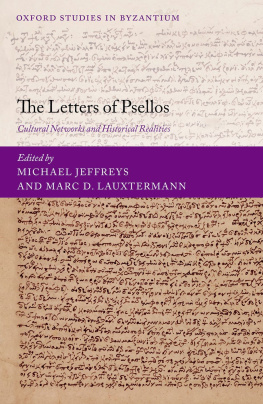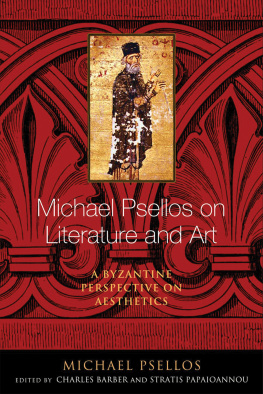Oxford Studies in Byzantium
Oxford Studies in Byzantium consists of scholarly monographs and editions on the history, literature, thought, and material culture of the Byzantine world.
Holy Sites Encircled
The Early Byzantine Concentric Churches of Jerusalem
Vered Shalev-Hurvitz
Law, Power, and Imperial Ideology in the Iconoclast Era
c.680850
M. T. G. Humphreys
Byzantium and the Turks in the Thirteenth Century
Dimitri Korobeinikov
Writing and Reading Byzantine Secular Poetry, 10251081
Floris Bernard
The Byzantine-Islamic Transition in Palestine
An Archaeological Approach
Gideon Avni
Shaping a Muslim State
The World of a Mid-Eighth-Century Egyptian Official
Petra M. Sijpesteijn
Niketas Choniates
A Historiographical Study
Alicia Simpson
Byzantines, Latins, and Turks in the Eastern Mediterranean World after 1150
Jonathan Harris, Catherine Holmes, Eugenia Russell
Debating the Saints Cults in the Age of Gregory the Great
Matthew Dal Santo
The Embodied Icon
Liturgical Vestments and Sacramental Power in Byzantium
Warren T. Woodfin
We have no king but Christ
Christian Political Thought in Greater Syria on the Eve of the Arab Conquest (c.400585)
Philip Wood
Tilling the Hateful Earth
Agricultural Production and Trade in the Late Antique East
Michael Decker

Great Clarendon Street, Oxford, OX2 6DP, United Kingdom
Oxford University Press is a department of the University of Oxford. It furthers the Universitys objective of excellence in research, scholarship, and education by publishing worldwide. Oxford is a registered trade mark of Oxford University Press in the UK and in certain other countries
Oxford University Press 2017
The moral rights of the authors have been asserted
First Edition published in 2017
Impression: 1
All rights reserved. No part of this publication may be reproduced, stored in a retrieval system, or transmitted, in any form or by any means, without the prior permission in writing of Oxford University Press, or as expressly permitted by law, by licence or under terms agreed with the appropriate reprographics rights organization. Enquiries concerning reproduction outside the scope of the above should be sent to the Rights Department, Oxford University Press, at the address above
You must not circulate this work in any other form and you must impose this same condition on any acquirer
Published in the United States of America by Oxford University Press 198 Madison Avenue, New York, NY 10016, United States of America
British Library Cataloguing in Publication Data
Data available
Library of Congress Control Number: 2016937164
ISBN 9780198787228
ebook ISBN 9780191091025
Printed and bound by CPI Group (UK) Ltd, Croydon, CR0 4YY
Links to third party websites are provided by Oxford in good faith and for information only. Oxford disclaims any responsibility for the materials contained in any third party website referenced in this work.
Preface
This volume consists of two uneven parts: a number of papers presented at a workshop dedicated to the correspondence of Michael Psellos, held in Oxford on 67 November 2010, and the summaries of all the letters of Michael Psellos compiled over many years of sustained research for the Prosopography of the Byzantine World project by Michael Jeffreys. The second part is obviously the most important one because it offers Byzantinists a shortcut into the often bewildering, and sometimes incomprehensible, letters of Michael Psellos; but it is hoped that the first part, too, may shed light on Psellos fascinating correspondence.
In an ideal world this volume would have come out after, not before Stratis Papaioannous forthcoming edition of the letters of Psellos; but as this world is far from ideal, we can only pray that this long-awaited edition will appear sooner rather than later. A negative result of our impatience in procuring this volume is that the studies and summaries refer to Psellos letters by what hopefully will soon become the old numbering. But the concordances in Papaioannous edition should solve this problem.
As this is the work of more than one person, readers will soon realize that there are disagreements between the various contributors. Disagreement is good: it is the lifeblood of true scholarship. In the case of Michael Psellos letters, where even the best Hellenists occasionally raise their hands in despair, pretending to know it all would be ridiculous. To quote my co-editor: Few of those who have spent years reading Psellos are confident of getting him right: the writer of these summaries is not one of them; neither am I.
If I have a concern, it is not disagreeing with my colleagues. Nor is it the precariousness of any interpretation in an author as difficult and elusive as Michael Psellos. It is that in an increasingly Greekless world fewer and fewer people are able to read this marvellous epistolographer in the original and understand why he deserves to be reckoned as one of the best stylists in the history of the Greek language. Psellos letters are, together with the Chronographia, his claim to immortality. Please read them. If you cant, at least take the shortcut and read the summariesand then, for heavens sake, learn Greek.
Marc Lauxtermann
Contents
| BCH | Bulletin de Correspondance Hellnique |
| BF | Byzantinische Forschungen |
| BMGS | Byzantine and Modern Greek Studies |
| BSl | Byzantinoslavica |
| Byz | Byzantion |
| BZ | Byzantinische Zeitschrift |
| CFHB | Corpus Fontium Historiae Byzantinae |
| DOP | Dumbarton Oaks Papers |
| EEBS |
| G | Gautier (see Part II Bibliography) |
| GRBS | Greek, Roman and Byzantine Studies |
| JB | Jahrbuch der sterreichischen Byzantinistik |
| K | Karpozilos (see Part II Bibliography) |
| KD | Kurtz-Drexl (see Part II Bibliography) |
| M | Maltese (see Part II Bibliography) |
| MEG | Medioevo Greco |
| Moore | P. Moore, Iter Psellianum (Toronto, 2005) |
| ODB | Oxford Dictionary of Byzantium |
| P | Papaioannou (see Part II Bibliography) |
| PBW | Prosopography of the Byzantine World |
| REB | Revue des tudes Byzantines |
| RESEE | Revue des tudes Sud-Est Europennes |
| S | Sathas (see Part II Bibliography) |
| Sathas MB IV | .. , (Paris, 1874) |
| Sathas MB V | .. , (Paris, 1876) |
| SIFC | Studi Italiani di Filologia Classica |
| Sn | Snipes (see Part II Bibliography) |








